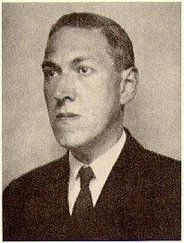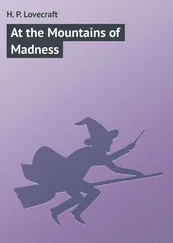Meanwhile Old Whateley continued to buy cattle without measurably increasing the size of his herd. He also cut timber and began to repair the unused parts of his house—a spacious, peaked-roofed affair whose rear end was buried entirely in the rocky hillside, and whose three least-ruined ground-floor rooms had always been sufficient for himself and his daughter. There must have been prodigious reserves of strength in the old man to enable him to accomplish so much hard labour; and though he still babbled dementedly at times, his carpentry seemed to shew the effects of sound calculation. It had already begun as soon as Wilbur was born, when one of the many tool-sheds had been put suddenly in order, clapboarded, and fitted with a stout fresh lock. Now, in restoring the abandoned upper story of the house, he was a no less thorough craftsman. His mania shewed itself only in his tight boarding-up of all the windows in the reclaimed section—though many declared that it was a crazy thing to bother with the reclamation at all. Less inexplicable was his fitting up of another downstairs room for his new grandson—a room which several callers saw, though no one was ever admitted to the closely boarded upper story. This chamber he lined with tall, firm shelving; along which he began gradually to arrange, in apparently careful order, all the rotting ancient books and parts of books which during his own day had been heaped promiscuously in odd corners of the various rooms.
“I made some use of ’em,” he would say as he tried to mend a torn black-letter page with paste prepared on the rusty kitchen stove, “but the boy’s fitten to make better use of ’em. He’d orter hev ’em as well sot as he kin, for they’re goin’ to be all of his larnin’.”
When Wilbur was a year and seven months old—in September of 1914—his size and accomplishments were almost alarming. He had grown as large as a child of four, and was a fluent and incredibly intelligent talker. He ran freely about the fields and hills, and accompanied his mother on all her wanderings. At home he would pore diligently over the queer pictures and charts in his grandfather’s books, while Old Whateley would instruct and catechise him through long, hushed afternoons. By this time the restoration of the house was finished, and those who watched it wondered why one of the upper windows had been made into a solid plank door. It was a window in the rear of the east gable end, close against the hill; and no one could imagine why a cleated wooden runway was built up to it from the ground. About the period of this work’s completion people noticed that the old tool-house, tightly locked and windowlessly clapboarded since Wilbur’s birth, had been abandoned again. The door swung listlessly open, and when Earl Sawyer once stepped within after a cattle-selling call on Old Whateley he was quite discomposed by the singular odour he encountered—such a stench, he averred, as he had never before smelt in all his life except near the Indian circles on the hills, and which could not come from anything sane or of this earth. But then, the homes and sheds of Dunwich folk have never been remarkable for olfactory immaculateness.
The following months were void of visible events, save that everyone swore to a slow but steady increase in the mysterious hill noises. On May-Eve of 1915 there were tremors which even the Aylesbury people felt, whilst the following Hallowe’en produced an underground rumbling queerly synchronised with bursts of flame—“them witch Whateleys’ doin’s”—from the summit of Sentinel Hill. Wilbur was growing up uncannily, so that he looked like a boy of ten as he entered his fourth year. He read avidly by himself now; but talked much less than formerly. A settled taciturnity was absorbing him, and for the first time people began to speak specifically of the dawning look of evil in his goatish face. He would sometimes mutter an unfamiliar jargon, and chant in bizarre rhythms which chilled the listener with a sense of unexplainable terror. The aversion displayed toward him by dogs had now become a matter of wide remark, and he was obliged to carry a pistol in order to traverse the countryside in safety. His occasional use of the weapon did not enhance his popularity amongst the owners of canine guardians.
The few callers at the house would often find Lavinia alone on the ground floor, while odd cries and footsteps resounded in the boarded-up second story. She would never tell what her father and the boy were doing up there, though once she turned pale and displayed an abnormal degree of fear when a jocose fish-peddler tried the locked door leading to the stairway. That peddler told the store loungers at Dunwich Village that he thought he heard a horse stamping on that floor above. The loungers reflected, thinking of the door and runway, and of the cattle that so swiftly disappeared. Then they shuddered as they recalled tales of Old Whateley’s youth, and of the strange things that are called out of the earth when a bullock is sacrificed at the proper time to certain heathen gods. It had for some time been noticed that dogs had begun to hate and fear the whole Whateley place as violently as they hated and feared young Wilbur personally.
In 1917 the war came, and Squire Sawyer Whateley, as chairman of the local draft board, had hard work finding a quota of young Dunwich men fit even to be sent to a development camp. The government, alarmed at such signs of wholesale regional decadence, sent several officers and medical experts to investigate; conducting a survey which New England newspaper readers may still recall. It was the publicity attending this investigation which set reporters on the track of the Whateleys, and caused the Boston Globe and Arkham Advertiser to print flamboyant Sunday stories of young Wilbur’s precociousness, Old Whateley’s black magic, the shelves of strange books, the sealed second story of the ancient farmhouse, and the weirdness of the whole region and its hill noises. Wilbur was four and a half then, and looked like a lad of fifteen. His lips and cheeks were fuzzy with a coarse dark down, and his voice had begun to break.
Earl Sawyer went out to the Whateley place with both sets of reporters and camera men, and called their attention to the queer stench which now seemed to trickle down from the sealed upper spaces. It was, he said, exactly like a smell he had found in the tool-shed abandoned when the house was finally repaired; and like the faint odours which he sometimes thought he caught near the stone circles on the mountains. Dunwich folk read the stories when they appeared, and grinned over the obvious mistakes. They wondered, too, why the writers made so much of the fact that Old Whateley always paid for his cattle in gold pieces of extremely ancient date. The Whateleys had received their visitors with ill-concealed distaste, though they did not dare court further publicity by a violent resistance or refusal to talk.
For a decade the annals of the Whateleys sink indistinguishably into the general life of a morbid community used to their queer ways and hardened to their May-Eve and All-Hallows orgies. Twice a year they would light fires on the top of Sentinel Hill, at which times the mountain rumblings would recur with greater and greater violence; while at all seasons there were strange and portentous doings at the lonely farmhouse. In the course of time callers professed to hear sounds in the sealed upper story even when all the family were downstairs, and they wondered how swiftly or how lingeringly a cow or bullock was usually sacrificed. There was talk of a complaint to the Society for the Prevention of Cruelty to Animals; but nothing ever came of it, since Dunwich folk are never anxious to call the outside world’s attention to themselves.
Читать дальше












